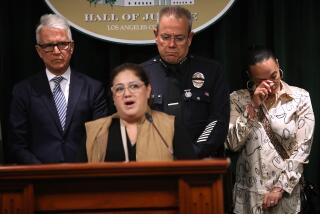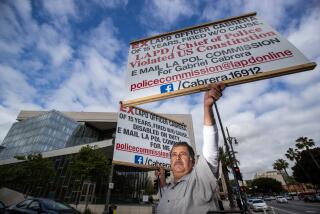Oxnard Officer Has Empathic Ear for Crime Victims
- Share via
Oxnard Police Officer Glenn McIntyre was off duty five years ago when his motorcycle slid into a drunk driver who tried to make a U-turn in front of him.
The impact of the collision broke McIntyre’s back in 17 places and left him paralyzed from the ribs down.
McIntyre was a 23-year-old patrol officer and had been out of the police academy for only 18 months when the accident left him in a wheelchair.
But McIntyre and the Oxnard Police Department have both made the best of the tragic accident. Although the department lost a good beat cop, it gained a desk officer with a particular sensitivity to victims of crimes and accidents.
Before McIntyre was injured, the department was considering creating a desk job for injured officers who could soothe crime victims, fill out reports and answer questions about the law. The position was a perfect fit.
“It was advantageous for him and the department,” said Lt. Stan Myers, McIntyre’s supervising officer. “It provided us with somebody with experience and knowledge. And, boy, he’s contributed a lot.”
Myers said that many times police officers on the street don’t have enough time to listen to victims or residents with a concern. But McIntyre “has the time to listen,” he said.
McIntyre agrees. He said that because he was a victim of an accident and a crime, he can now better sympathize with the victims he comforts at the police station.
“I can relate to them being disabled or I can relate to them as victims,” he said. “I tell them if you didn’t end up with a permanent injury or you didn’t lose something that you can’t replace, that money can’t buy, then you’re doing all right.”
Police Chief Robert Owens said he offered McIntyre the position of answering phone calls from victims because “we knew he was a good man, a good officer.”
Because McIntyre’s accident occurred while off duty, he was not eligible for many of the Police Department’s insurance benefits, Owens said. To aid their disabled colleague, several police officers donated their sick leave so that McIntyre wouldn’t lose his regular paycheck, he said.
“We are like a family,” he said. “We try to support each other.”
Although he said he tries to be encouraging to victims, McIntyre has had to struggle in his own life.
“There are a lot of people that have bounced back better than I, and there are some who haven’t bounced back as well,” he said.
McIntyre said it took him five months to learn how to dress himself and 10 months to learn how to use the bathroom without any help. And then there is the constant pain, which he said is “like someone digging their knuckles into your back.”
Although the struggle to fight off depression and frustration continues every day, McIntyre said, things are looking up.
In 1986, he bought a two-bedroom house in Oxnard, which he has renovated for wheelchair access. He installed a Jacuzzi specially designed so he can get in and out without help.
Last year, he married Hellmi Chavez, a young records clerk he met at work. Merlin, a black Labrador service dog who spends almost 24 hours a day at his master’s side, carried the rings in a basket during the wedding ceremony.
McIntyre, a blond, blue-eyed native of Laguna Beach, competes in tennis tournaments for the handicapped and lectures schoolchildren about the capabilities of the disabled. St. John’s Regional Medical Center has sponsored McIntyre in the tournaments.
“I don’t like being in a chair,” he said. “I hate being in a chair. I want to change my own light bulbs and I want to paint my own house and do my own gardening. But I wouldn’t change what I have with my wife and my dog and the Police Department and the community of Oxnard.”
When asked, he does not hesitate to recount the events involving the motorcycle accident that so drastically altered his life.
On the night of April 5, 1985, McIntyre was headed north on Pacific Coast Highway in Laguna Beach, returning from Palm Springs with a woman friend on the back of his bike, when a Ford Mustang suddenly cut in front of him, beginning a U-turn.
McIntyre, who was riding at about 45 miles per hour, had just enough time to apply the brakes and slide the motorcycle onto its side.
Although the impact of the crash broke his back and shattered his hip and five ribs, McIntyre never lost consciousness. His friend suffered several broken bones but recovered with no permanent injuries.
The driver of the car was not injured. However, police tests later showed that the driver had a 0.18% blood-alcohol level and had used cocaine that day. Several witnesses said they saw the man stagger into the Mustang just before the accident but no one tried to stop him.
“I wasn’t angry at the guy,” McIntyre said. “I met him several months later in court. He just cried and said he was sorry.”
The driver was sentenced to one year in jail and ordered to pay $65,000 in restitution to McIntyre. The drunk driver spent eight months in jail and has yet to pay the restitution, McIntyre said.
McIntyre admits that the episode made him “a little frustrated with the whole justice system,” but he said he tries not to let it discourage him or affect his work.
McIntyre underwent 14 hours of surgery before he was strapped face down onto a special hospital bed that nurses rotated every two hours to keep him from developing bedsores. He remained strapped to that bed for two weeks.
Initially, McIntyre said, he considered suicide to end the agonizing pain in his back.
“They had a 24-hour watch on me for several weeks because it was so depressing,” he said. “The pain was unbearable. Sometimes you just lay there and scream and cry for hours.”
But he survived the eight months in the hospital with the support of his parents and many friends.
Things were different when McIntyre returned to the police station. It bothered him that his colleagues had to look down to meet his eyes. And although he continues to be physically active, he said some officers began to greet him with a feeble handshake.
“People should know that being in a chair you still have the same wants,” he said. “You want to do everything just like before and you really hate it when someone looks at you differently.”
Hellmi, his wife, said that even after McIntyre got out of the hospital and returned to work, he was often depressed and frustrated. She said much of her time with him has been spent motivating him to do such basic things as getting dressed.
“To be married to someone who is in a chair can be a lot of work,” she said. “But when you are in love with someone it really doesn’t matter.”
More to Read
Sign up for Essential California
The most important California stories and recommendations in your inbox every morning.
You may occasionally receive promotional content from the Los Angeles Times.














